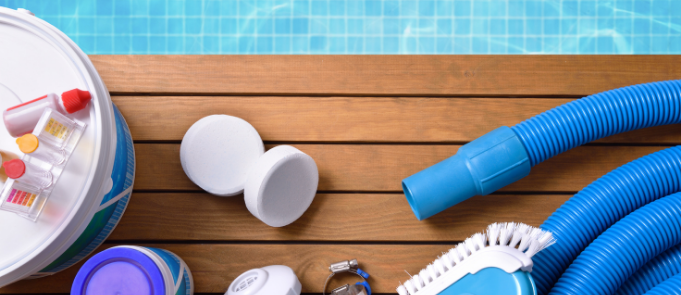
Gunite Pool Maintenance
Pool maintenance is the process of checking and cleaning an in-ground or above-ground water feature. It is done to preserve the pool’s quality, efficiency, cleanliness, and safety for swimming or recreational use. Gunite pools require a specific maintenance regimen to stay looking and functioning their best.
You must follow the care instructions on handling any chemicals to protect you and others from exposure. As such, you should use safety equipment and wear protective clothing at all times. If you keep up with the maintenance instructions and tend to your pool’s needs regularly, everything will be easy-breezy.
This is because taking care of your gunite pool should be more than just a chore. You will get what you put in, so if you take care of your gunite pool, it will last through the years and stay clean and beautiful for everyone to enjoy.
We specialize in constructing and remodeling gunite pools, but we also like taking charge of maintaining them and giving you the experience of a full range of services. Therefore, we want to provide you with comprehensive and accurate information for your gunite pool maintenance, including an overview of your to-do list:
Clearing Debris
Leaves, bugs, dirt, and other debris collect in your pool all year round. While you cannot avoid this with an outdoor pool, failing to clear away the waste will result in an increased risk of algae build-up and circulation issues. Use a long-handled net to remove debris, helping maintain a clean and sanitary pool.
Cleaning the Interior
As a general rule, pool owners must clean up any debris falling into their pools as soon as possible. Ensure to scrub away stubborn build-up around the waterline, steps, and the pool floor every couple of weeks as well. Use either a manual vacuum or automatic cleaner for efficient and thorough cleaning. If you wait too long between the clean-ups, you might find yourself scraping off massive layers of dirt and debris.
Cleaning the Filter
Your pool filter is an integral part of a healthy pool environment. As it does the work of keeping your pool water clean, it has to be cleaned out regularly to keep it functioning at the optimal level. This will help you avoid costly repairs and maximize its lifespan.
Cleaning Skimmer and Pump Baskets
For maximum water efficiency, clean your skimmer and pump basket thoroughly every week. These types of equipment should be kept free of common debris, such as leaves, twigs, and dirt that is easily removed by a quick from your garden hose. A weekly scrub with a special brush will remove the debris left behind from the rake. When not in use, cover your pool to reduce any waste that may find its way in.
Using and Pump
Your pump runs almost continuously on certain days, but you cannot turn it on for the entire day. How long you should run your pump depends on how often you use it and how warm your water is. Setting it for eight hours a day is generally sufficient for most pools to keep their chemicals adequately balanced.
Checking for Leaks
Before hooking up the filter and pump to your pool, it is vital to make sure they are connected correctly and that there are no loose fittings. If you find a leak, tighten the clamps immediately to prevent a more significant and expensive problem later on.
Testing Chemicals
Chemicals are essential in keeping your pool clean and clear. They help prevent the growth of bacteria, algae, fungi, and other certain materials that badly affect water quality. It is recommended to test the pool’s chemistry weekly to help reduce these problems and ensure the longevity of materials within the swimming environment.
Keeping track of chemicals in your pool is not a difficult task. You may ask a professional to do it for you or DIY the whole process. All you have to do is make sure they are within the given ranges and in this order specifically as they all affect each other:
- total alkalinity: 80 to 120 ppm
- pH: 7.2 to 7.8
- calcium hardness: 200 to 400
- stabilizer (cyanuric acid): 20 to 50 ppm
- chlorine: 2.0 to 3.0 ppm
Maintaining Correct Water Level
Maintaining the correct water level of your pool is also something that you should not overlook. If you have an automatic water supply, this will not be much of a problem for you. However, if you do not, manually filling your pool with water using a garden hose would be just fine too. Just make sure to rebalance your chemicals each time.
Winterizing
If you do not completely drain your pool each winter, you should take precautions to avoid issues from when you want to use it again. This process is called winterizing, and there are many things you will need to do to ensure that it will still function properly once the sun comes back out.
These include maintaining the chemical balance, applying pool shock and algaecide, cleaning the pump and filter, draining the water to the recommended level, draining the pool hoses and the water to the recommended level, and covering the pool. Failure to take these necessary steps can result in cracks in the plaster or cement surfaces that will be difficult to repair.

